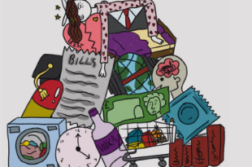Christmas: a time for love, peace, joy…and shopping.
No matter your religion or personal traditions, the festive period is, for most, a time to be spent with family and friends, sharing memories and wrapping up the year. However, over the past few decades, Christmas has become increasingly commercialised – and with people desperate to get back to ‘normality’ after the effects of the pandemic on last year’s festive season, it seems that the commercialisation of the season is only increasing.
The average UK household spends 29% more in December than in any other typical month. One of the major sources of this spend is Black Friday, which was brought over to the UK in 2010 by the king of consumerism: Amazon. This year, Black Friday sales were the highest they’ve ever been, with highstreet shoppers spending a fifth more than in 2020. It seems that people were more eager than ever to get their hands on the latest deals; however, when you take into account the effects of these purchases, they don’t seem so desirable anymore.
Let’s take clothing as an example. The fast-fashion retailer Pretty Little Thing had their annual Black Friday Sale this year, offering up to 80-100% off certain items, causing many to buy more clothes than they could ever need. Many criticised the brand for this move, questioning how they were paying the people making the clothes a proper living wage when they were being sold for so little.
This also brings into question the value of material items to consumers – if we are buying items such as clothing for as little as a few pennies, then how can we truly be valuing the item? More importantly – where is it going to end up? In this case, the sad answer is often to landfill – an estimated £140 million worth of clothing is sent to UK landfill each year.
But it’s not just clothes – electronics are also a major contributor. Material Focus estimates that 5 million unwanted electrical items will be thrown away or hoarded after Christmas, and with the problem of e-waste piling up year after year (54m tonnes of e-waste were generated worldwide in 2019), this can no longer be ignored.
We must ask ourselves why exactly do we feel the need to buy so much stuff for each other for Christmas – and, as data shows, why are we buying more stuff as the years go on?
Although it is true that we may want to show our loved ones our appreication for them in the form of gift-giving, surely the sheer volume of items that we are purchasing are not necessary to achieve this. Clever marketing from retailers and the lure of next-day-delivery will have you believe that aquiring more goods will make you happier; but deep down, we all know this isn’t really true.
At it’s heart, Christmas is a time for celebrating the year with those you love; with the current threat of climate change and global poverty, how can we live with such vast amounts of consumerism year upon year? Perhaps it is time that Christmas was updated for a world in crisis, and we were all reminded of what really matters.



